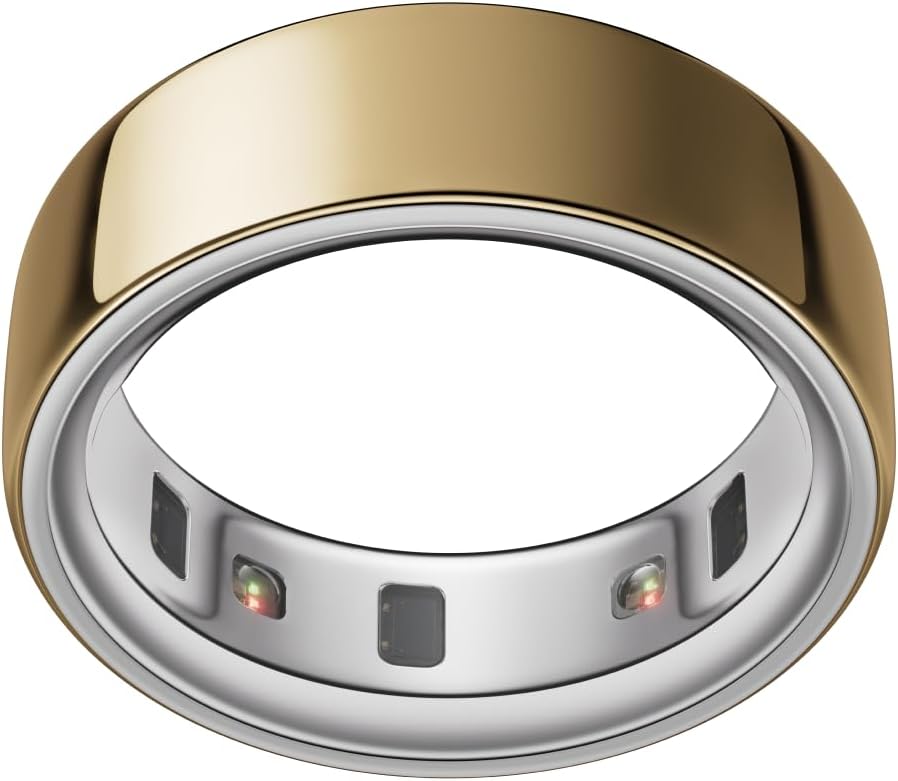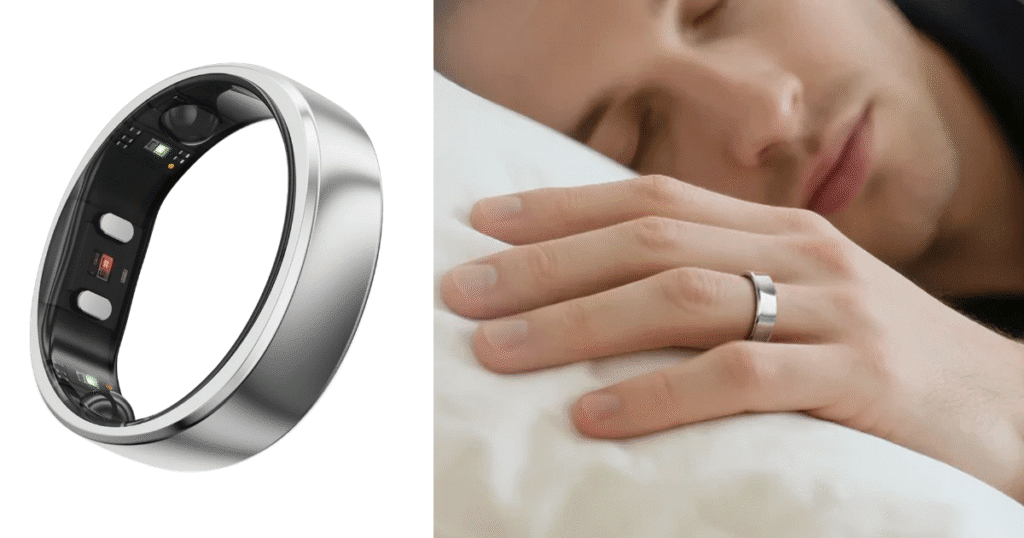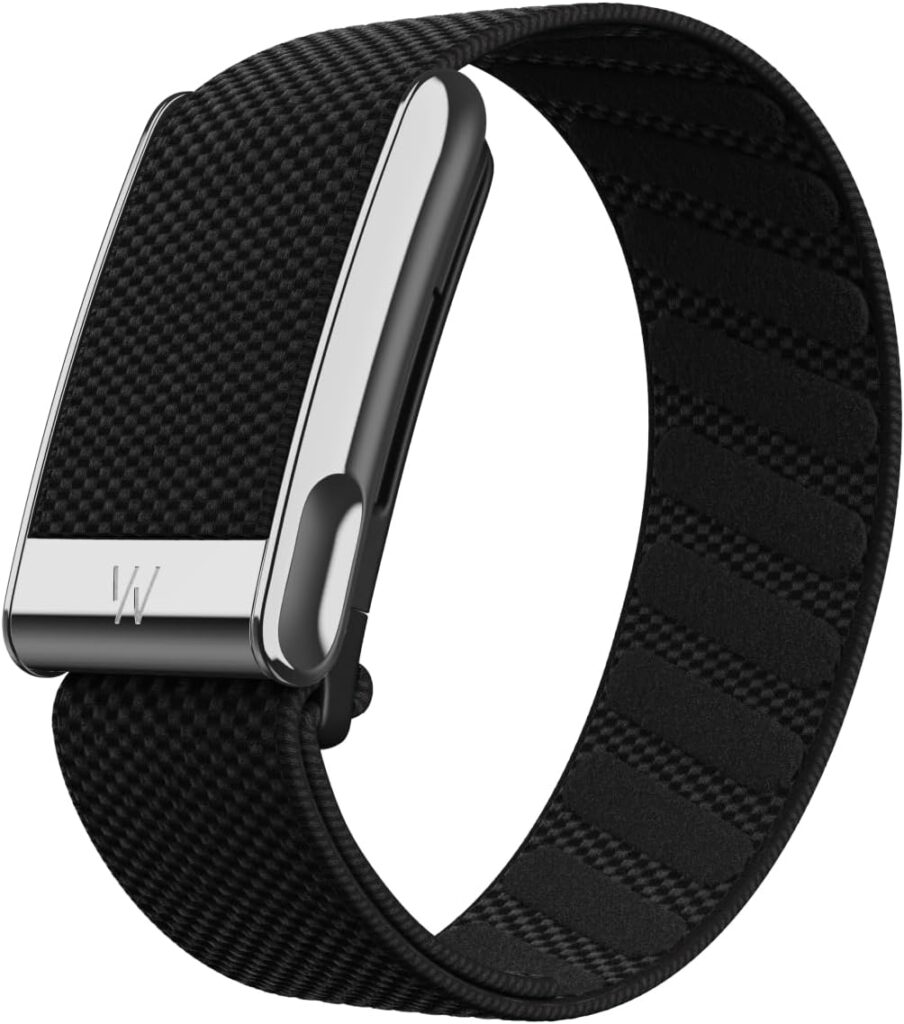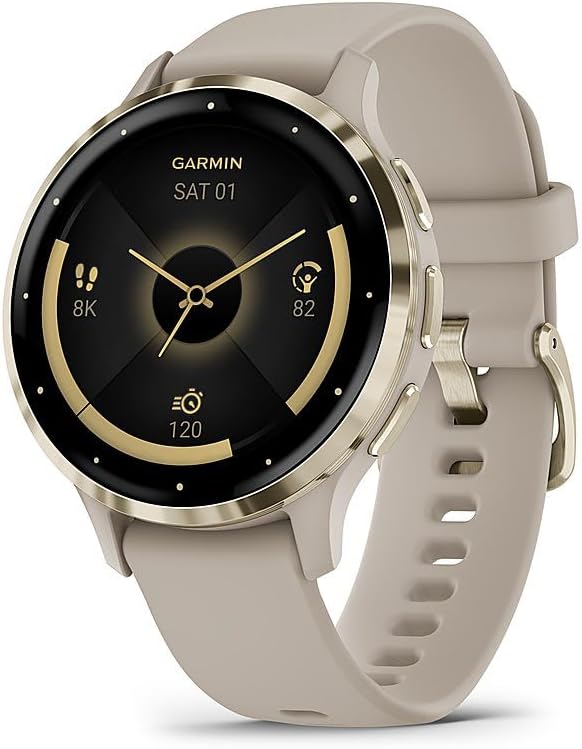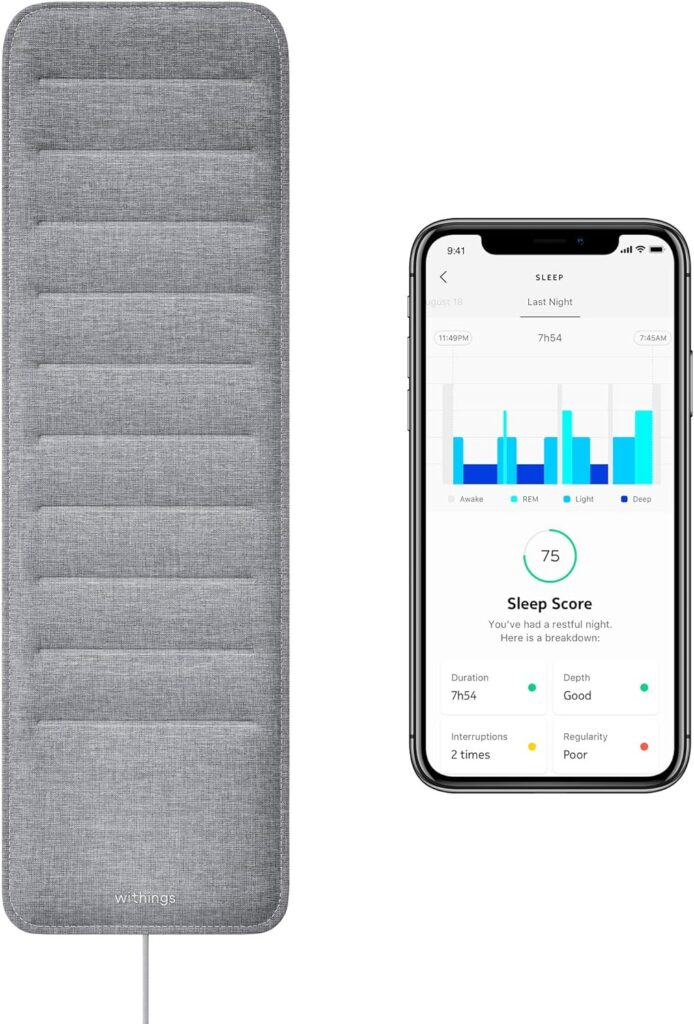5 Best Sleep Tracking Devices of 2025: Wearables, Non-Wearables & Smart Rings
Tossing and turning all night, only to wake up feeling exhausted? You’re not alone—millions of people struggle with poor sleep quality every day. The consequences go beyond just feeling tired; poor sleep affects your productivity, mood, and long-term health.
If you’re frustrated by constant fatigue, worried about potential sleep disorders, or simply overwhelmed by the sheer number of sleep tracking options available, this guide is for you.
Sleep trackers have evolved into powerful tools that provide data-driven insights into your sleep patterns, helping you make meaningful changes to wake up feeling truly refreshed.
In this article, we’ll uncover the top 5 sleep trackers for 2025—including wearables, non-wearables, and smart rings—all highly rated and available for easy purchase online.
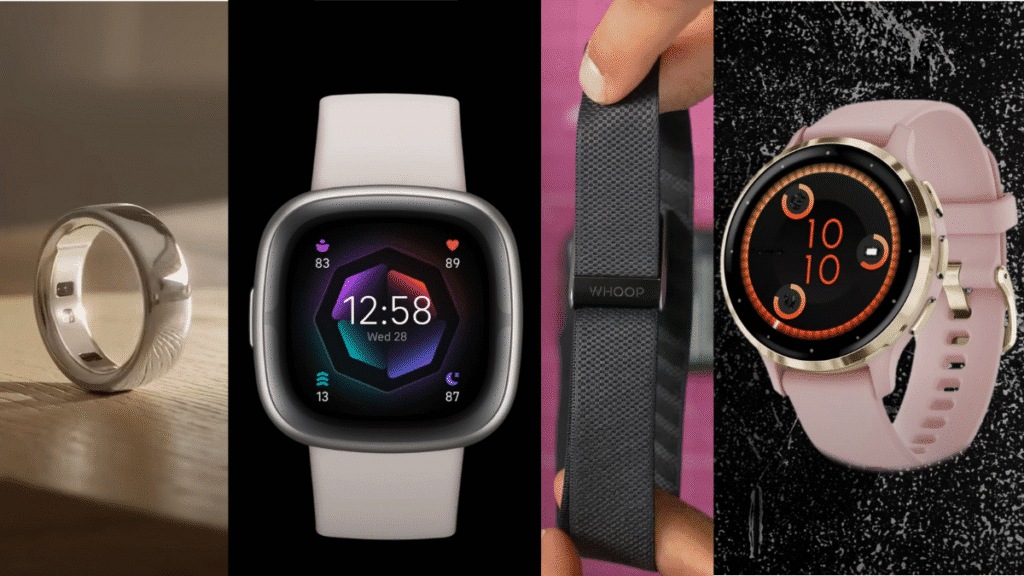
Disclosure: This post is reader-supported and contains affiliate links. As an Amazon Associate, we may earn from qualifying purchases at no extra cost to you.
Why Use a Sleep Tracking Device?
Before diving into specific products, it’s important to understand why sleep tracking is so helpful. These gadgets aren’t just fancy toys—they provide real data about your sleep cycles, including how much time you spend in light sleep, deep sleep, and REM sleep.
Many devices even help detect patterns like snoring, irregular breathing, or frequent waking periods that could indicate underlying issues like sleep apnea or insomnia. Tracking your sleep helps you identify what might be affecting your rest, so you can take action to improve your overall health and well-being.
Top 5 Sleep Tracking Devices for 2025
- Best Overall – Oura Ring Gen 4
- Best for Sleep Apnea Monitoring & Subscription-Free – RingConn Gen 2
- Best for Athletes & Recovery – Whoop 5
- Best Smartwatch for Sleep Tracking – Garmin Venu 3S
- Best Non-Wearable Sleep Tracker – Withings Sleep Mat
1. Oura Ring Gen 4: The Ultimate Sleep Tracking Ring
Struggling with bulky wearables that disrupt your sleep? The Oura Ring Gen 4 offers a stylish, lightweight solution with cutting-edge sensors that won’t interfere with your rest.
You’ll barely notice you’re even wearing it.
Key Features:
- Advanced Sleep Stage Monitoring: Tracks light, deep, and REM sleep with exceptional accuracy
- Comprehensive Health Metrics: Monitors heart rate, temperature, blood oxygen levels, and HRV
- Impressive Battery Life: Up to 8 days between charges
- Personalized Insights: Provides Sleep, Activity, Readiness Scores (and more!) to guide your wellness journey
- Discreet Design: Wear it comfortably 24/7 without feeling like you have a device on
Who It’s Perfect For:
The Oura Ring Gen 4 is ideal for those who want comprehensive sleep data without the bulk of a wristband or watch. It’s especially valuable if you’re sensitive to wearables during sleep but still want detailed insights to optimize your rest and recovery.
Drawbacks:
- Premium price point
- Limited activity tracking features compared to smartwatches
- Subscription: New members receive a complimentary month of membership after which a monthly subscription costs approximately $5.99/month. This is optional and the Oura Ring can still be used without it but with only base functionality
Check Latest Price of the Oura Ring Gen 4 on Amazon →
2. RingConn Gen 2: Best for Sleep Apnea Monitoring
Key Features:
- Sleep Apnea Monitoring: AI-powered technology provides real-time AHI (Apnea-Hypopnea Index) data and personalized insights
- Extended Battery Life: Up to 12 days between charges (varies by ring size – larger sizes last longer)
- No Subscription Required: Lifetime access to all health tracking features without monthly fees
- Comprehensive Health Tracking: Monitors sleep stages, heart rate, blood oxygen levels, stress, and HRV
- Water Resistant: Up to 100m water resistance for swimming and daily activities
- HSA/FSA Eligible: Approved for Flexible Spending Account and Health Savings Account purchases
Who It’s Perfect For:
The RingConn Gen 2 is ideal for individuals who suspect they may have sleep apnea or want comprehensive sleep health monitoring without ongoing subscription costs.
It’s particularly valuable for those who want detailed breathing pattern analysis alongside standard sleep tracking metrics. You can read our full review here.
Drawbacks:
- Uses unique sizing standards different from other rings – however a free sizing kit is available upon purchase
- Limited activity tracking features compared to smartwatches
- No GPS or Wifi functionality
Check Latest Price of the RingConn Gen 2 →
3. WHOOP 5.0: Best for Athletes and Recovery
Want comprehensive health insights alongside sleep tracking? The WHOOP Life is the premium option in WHOOP’s latest lineup, offering advanced monitoring capabilities for those serious about optimizing their sleep and overall health.
Key Features:
- Extended Battery Life: Impressive 14+ days between charges
- Continuous Health Monitoring: Tracks sleep cycles, stress levels, VO2 max, and recovery 24/7
- Advanced Heart Health: Features on-demand ECG readings to detect potential signs of AFib
- Blood Pressure Insights: Provides systolic and diastolic ranges without a traditional cuff
- Sleep Performance Analysis: Measures sleep quality, stages, and needs versus actual rest obtained
Who It’s Perfect For:
WHOOP Life is ideal for health-conscious individuals who want detailed sleep tracking within a comprehensive health monitoring system. It’s especially valuable for those concerned about cardiovascular health alongside sleep quality and athletic recovery.
Drawbacks:
- Premium price point
- No display screen for checking stats without the app
- Membership renewal required after the first year
Check Latest Price of the WHOOP on Amazon →
Note: WHOOP also offers more affordable options in their latest lineup: WHOOP One which provides basic sleep and activity tracking, and WHOOP Peak which adds stress monitoring and healthspan insights but lacks the ECG and blood pressure features of WHOOP Life.
4. Garmin Venu 3S: Premium Sleep and Health Tracking
If you’re looking for top-tier health tracking without the bulk, the Garmin Venu 3S is for you. This mighty wearable packs advanced sleep and fitness features into a sleek 41mm design—perfect for smaller wrists, with impressive battery life to match.
Key Features:
- Sleep Coach: Provides detailed sleep stage analysis and personalized recommendations to improve sleep quality
- Morning Report: Offers a daily summary of your sleep quality, recovery status, and suggested workouts
- Body Battery™ Energy Monitoring: Tracks your energy reserves throughout the day based on sleep quality and activity
- Impressive Battery Life: Up to 10 days on a single charge, allowing for uninterrupted sleep tracking
- Bright AMOLED Display: Colorful touchscreen that’s easy to read in all lighting conditions
Who It’s Perfect For:
The Garmin Venu 3S is ideal for active individuals who want detailed sleep insights within a comprehensive health monitoring system. Its smaller size makes it comfortable for overnight wear, while its long battery life means you won’t need to charge it mid-week, ensuring continuous sleep data.
Drawbacks:
- Premium price point
- Limited texting capabilities compared to some competitors
- 8GB storage may be limiting for those who store music on their watch
Check Latest Price of the Garmin Venu 3S on Amazon →
5. Withings Sleep Tracking Mat: Best Non-Wearable Option
Hate wearing devices while sleeping? The Withings Sleep Mat sits discreetly under your mattress, tracking your sleep cycles without requiring you to wear anything at all.
Key Features:
- Zero-Contact Sleep Tracking: Monitors sleep directly through your mattress without requiring any wearable device
- Advanced Sleep Cycle Analysis: Tracks light, deep, and REM sleep stages throughout the night
- Heart Rate Monitoring: Captures overnight heart rate patterns for comprehensive health insights
- Snore Detection: Identifies and records snoring episodes to help address potential breathing issues
- Smart Home Integration: Works with IFTTT to automate your bedroom environment based on when you get into and out of bed
- Alexa Compatible: Allows you to check your sleep trends by day, week, or year using voice commands
Who It’s Perfect For:
The Withings Sleep is ideal for those who find wearables uncomfortable or disruptive to their sleep. It’s perfect for anyone who wants detailed sleep insights without having to remember to charge or wear a device, making it particularly valuable for those who prioritize convenience alongside thorough sleep analysis.
Drawbacks:
- May require proper positioning under the mattress for best accuracy
- Mixed reviews on accuracy of snore detection
Check Latest Price of the Withings Sleep Tracking Mat on Amazon →
Sleep Tracking Wearables Comparison Chart
To help you make an informed decision, here’s a quick comparison of our top sleep trackers:
| Sleep Tracker | Form Factor | Sleep Stages | Battery Life | Best For |
|---|---|---|---|---|
| Oura Ring Gen 4 | Smart Ring | Light, Deep, REM | 8 days | Discreet tracking for those who want detailed sleep insights without a bulky wearable |
| WHOOP Life | Wristband | Light, Deep, REM | 14+ days | Recovery-focused sleepers who want to understand how sleep affects performance |
| RingConn Gen 2 | Smart Ring | Light, Deep, REM | 10-12 days | Sleep apnea monitoring and health tracking without subscription fees. |
| Garmin Venu 3S | Smartwatch | Light, Deep, REM | 10 days | Detailed sleep insights with morning reports and actionable recommendations |
| Withings Sleep | Under-mattress | Light, Deep, REM | Plugs in | Those who hate wearing devices to bed but still want comprehensive sleep tracking |
How to Choose the Best Sleep Tracker for Your Needs
Finding the right sleep tracker starts with understanding your lifestyle, comfort preferences, and sleep goals. Here’s how to narrow down the best option for you:
1. Set Your Budget
- Best Premium Sleep Trackers: Oura Ring Gen 4 or Garmin Venu 3 offer advanced health insights and detailed sleep analysis.
- Best Mid-Range Options: RingConn Gen 2 & WHOOP 4.0 (note: WHOOP requires a monthly subscription).
- Top Budget Pick: Withings Sleep provides solid tracking at an affordable price.
2. Prioritize Comfort and Wearability
- Don’t Like Wearables? Withings Sleep fits under your mattress for zero contact.
- Prefer Minimal Wearables? Oura Ring Gen 4 is discreet and lightweight.
- Comfortable with Wrist Devices? Go with Garmin Venu 3, or WHOOP 4.0.
3. Match Your Tracker to Your Sleep Goals
- For Balanced Sleep and Activity Tracking: Oura Ring Gen 4 is a top all-rounder.
- For Athletic Performance Tracking: WHOOP 4.0 and Garmin Venu 3 offer recovery metrics and training insights.
- For Sleep Apnea or Disturbance Detection: RingConn Gen 2 is able to track sleep apnea as well as sleep stages, Heart Rate Variability (HRV) and SpO2.
Tips to Improve Your Sleep Quality with a Tracker
Once you’ve chosen the best sleep tracker for your lifestyle, apply these proven strategies to get better rest:
- Control Light Exposure: Get morning sunlight and reduce screen time before bed.
- Exercise Daily: Regular movement supports better sleep—but skip intense workouts right before bed.
- Stick to a Routine: Go to sleep and wake up at the same time every day, even on weekends.
- Optimize Your Sleep Environment: Keep your room cool (65–68°F), quiet, and dark.
- Wind Down Mindfully: Use meditation, journaling, or light stretching to signal bedtime.
- Limit Stimulants: Avoid caffeine after noon and minimize alcohol close to bedtime.
Frequently Asked Questions About Sleep Trackers
What is the best sleep tracker without subscription?
The Garmin Venu 3S, RingConn Gen 2, and Withings Sleep are some of the top subscription-free sleep trackers available. RingConn Gen 2 offers comprehensive sleep stage analysis and sleep apnea monitoring without monthly fees. Garmin provides excellent battery life and detailed morning reports, while Withings offers a completely non-wearable solution that works under your mattress.
Is Fitbit or Oura better for sleep tracking?
Oura Ring generally provides more accurate sleep tracking than Fitbit due to its position on the finger where blood flow signals are stronger. However, Fitbit offers a more complete health ecosystem if you want fitness tracking alongside sleep monitoring. Your choice depends on whether you prioritize accuracy (Oura) or versatility (Fitbit).
Is sleep tracking worth it?
Sleep tracking is worth it for those looking to understand and improve their sleep quality. Research shows that sleep trackers can lead to better sleep when the data is used to make lifestyle changes. Identifying patterns in your sleep cycles, disturbances, and habits can help address underlying issues and optimize your rest quality.
What is the gold standard for sleep tracking?
Polysomnography (PSG) conducted in a sleep lab remains the gold standard for sleep tracking. For consumer devices, the Oura Ring is often considered the closest to clinical accuracy. Non-wearable options like the Withings Sleep also provide reliable data by measuring body movement, heart rate, and breathing patterns through your mattress.
What device is most accurate for sleep tracking?
The Oura Ring Gen 4 consistently ranks as the most accurate consumer sleep tracker, with validation studies showing 85-90% agreement with laboratory sleep testing for sleep staging. Its finger placement provides better heart rate signal quality than wrist-based devices, leading to more precise sleep stage detection and sleep quality assessment.
Is the Oura Ring worth it?
The Oura Ring is worth it if you prioritize sleep tracking accuracy and comfort. Its discreet design makes it ideal for 24/7 wear, and its battery lasts up to 8 days. The comprehensive sleep metrics and recovery insights justify the investment for those serious about improving their sleep quality and understanding how it affects daily performance.
Is Oura better than Garmin?
Oura excels in sleep tracking accuracy and comfort, while Garmin offers better overall fitness features and battery life. For dedicated sleep tracking, Oura’s ring form factor provides more consistent readings than Garmin’s wrist-based approach. We recommend choosing Oura if sleep data is your priority; select Garmin if you want a balance of sleep insights and comprehensive fitness tracking.

